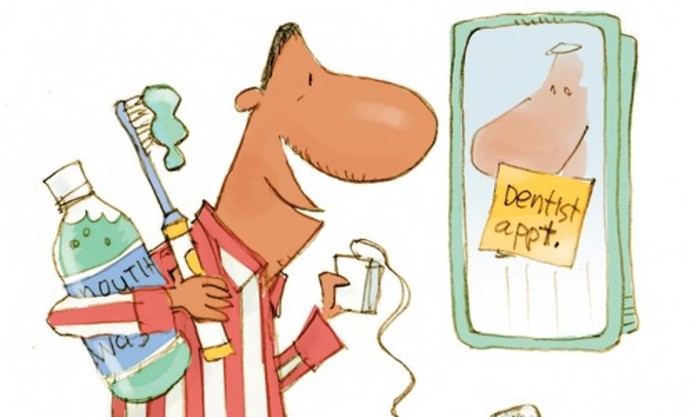People think that the harder they brush their teeth, the better results and whiter teeth they’ll get but the opposite is true. Aggressive brushing causes permanent damage to the teeth and gums, and can lead to receding gums, sensitivity, decay of roots and teeth and tooth loss.
The term "brushing teeth" creates the illusion of needing strong scrubbing or brushing, but in practice, teeth should be cleaned and not brushed.
Hold the brush with your index, middle finger and thumb and not with the whole palm. This way you won’t brush with so much force that over time will wear down teeth and give them a dull, not bright look.
Studies show that a significant proportion of the western population has difficulty maintaining regular oral hygiene. Many people do clean their teeth, but in an inefficient manner which doesn’t clean them sufficiently.
It turns out that many people brush their teeth too aggressively which can damage the teeth and gums and create a number of problems that over time can lead to tooth loss.

What are the dangers of brushing too hard?
Sensitivity to heat/cold/sweet: Gums are damaged by strong pressure applied to them, slowly receding until the neck of the tooth is exposed. This creates a "neck sensitivity" which causes pain every time the teeth come in contact with heat, cold and sweet items.
Caries: Aggressive brushing causes the tooth root to be exposed to bacteria and tooth decay, so the chance of cavities increases significantly.
Damage to the enamel: Obsessive brushing (over three times a day) can damage and erode the enamel layer so that over time the teeth will lose their natural luster and become dull. Regular and prolonged use of abrasive toothpastes such as whitening toothpastes also erodes tooth enamel and gum tissue.
Aesthetic damage: As a result of the erosion of the gums and their retraction, the appearance of "longer" teeth is obtained. The teeth didn't grow longer but the gums receded and a larger area of the tooth was exposed.
Irreversible erosion in the crown of the tooth: Erosion occurs mainly in the neck area of the tooth, where enamel is thinner. Erosion can lead to increased sensitivity and decay.
How to treat worn teeth: Switch to a soft and gentle brush. Acquire a proper brushing technique. Use fluoride rinse with caution. Treat sensitivity by various preparations that the dental hygienist or dentist applies to the affected areas.
In the most extreme cases it’s necessary to restore the receding gums via a surgical technique, and use root canals and crowns to repair damage to teeth.
Best brushing practice
Clean teeth twice a day - in the morning and in the evening before bed with a toothbrush with rounded and soft nylon fibers, with the size of the brush head covering two teeth at once, and the handle of the brush long enough and comfortable to hold.
The brush should be placed in the line between the gums and teeth, with the brush fibers tilted 45 degrees towards the gums. Move the brush in a circular manner i.e. don’t saw back and forth, and the pressure on the brush should be moderate and consistent.
Toothbrushes wear out, so it’s recommended to replace the toothbrush regularly every three to four months or so, or earlier if the brush hairs have worn out. In addition, after being sick replace the brush since bacteria that were in the body can pass to the toothbrush, grow, multiply and cause us damage.
Dr. Ariel Savyon is a dentist and director of the Savyon Medical Center clinic in Rishon Lezion, with an M.Sc. In Laser Science. He’s certified in board-certified diplomate implementation and minimally-invasive microscopy dentistry.
